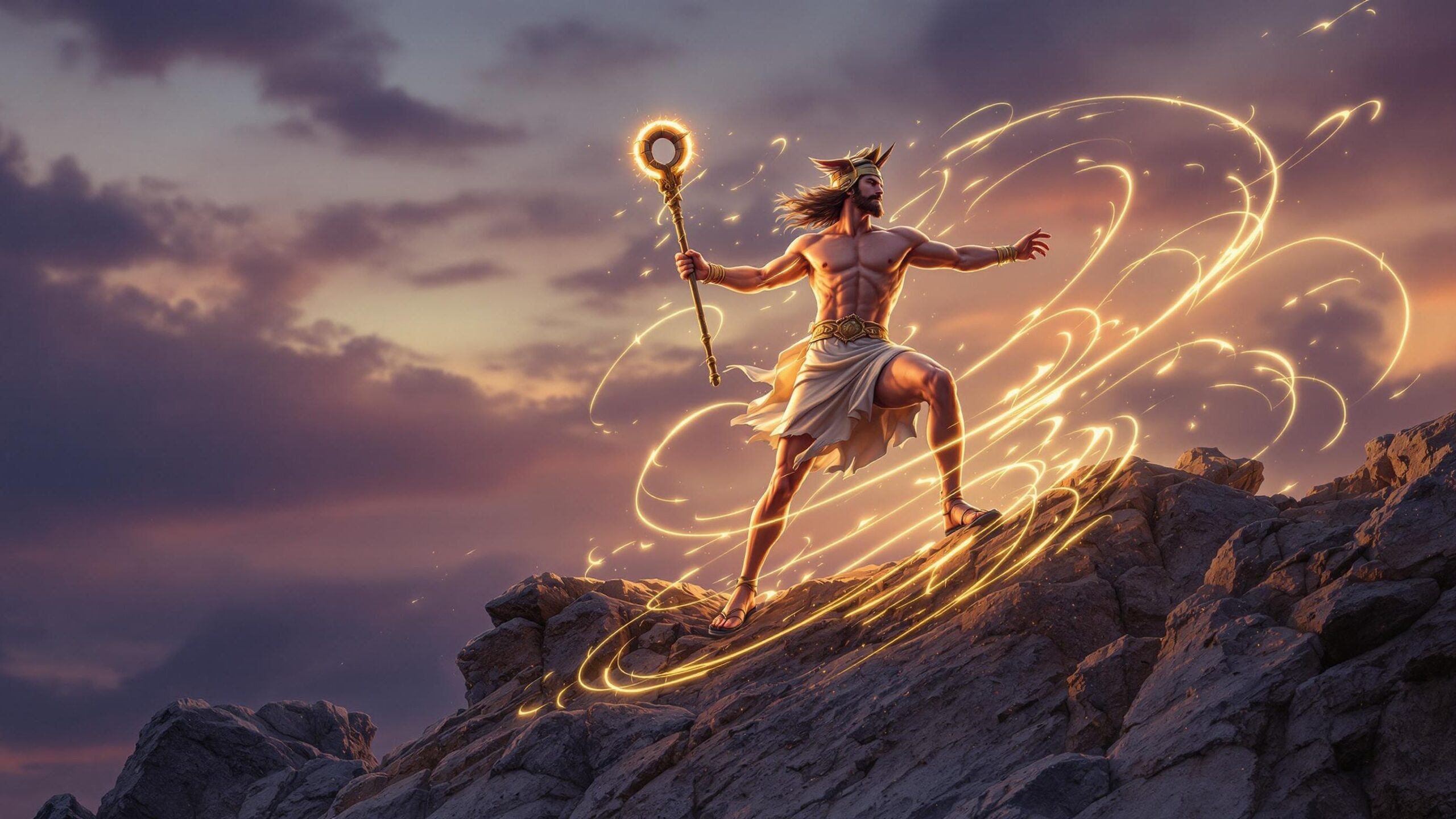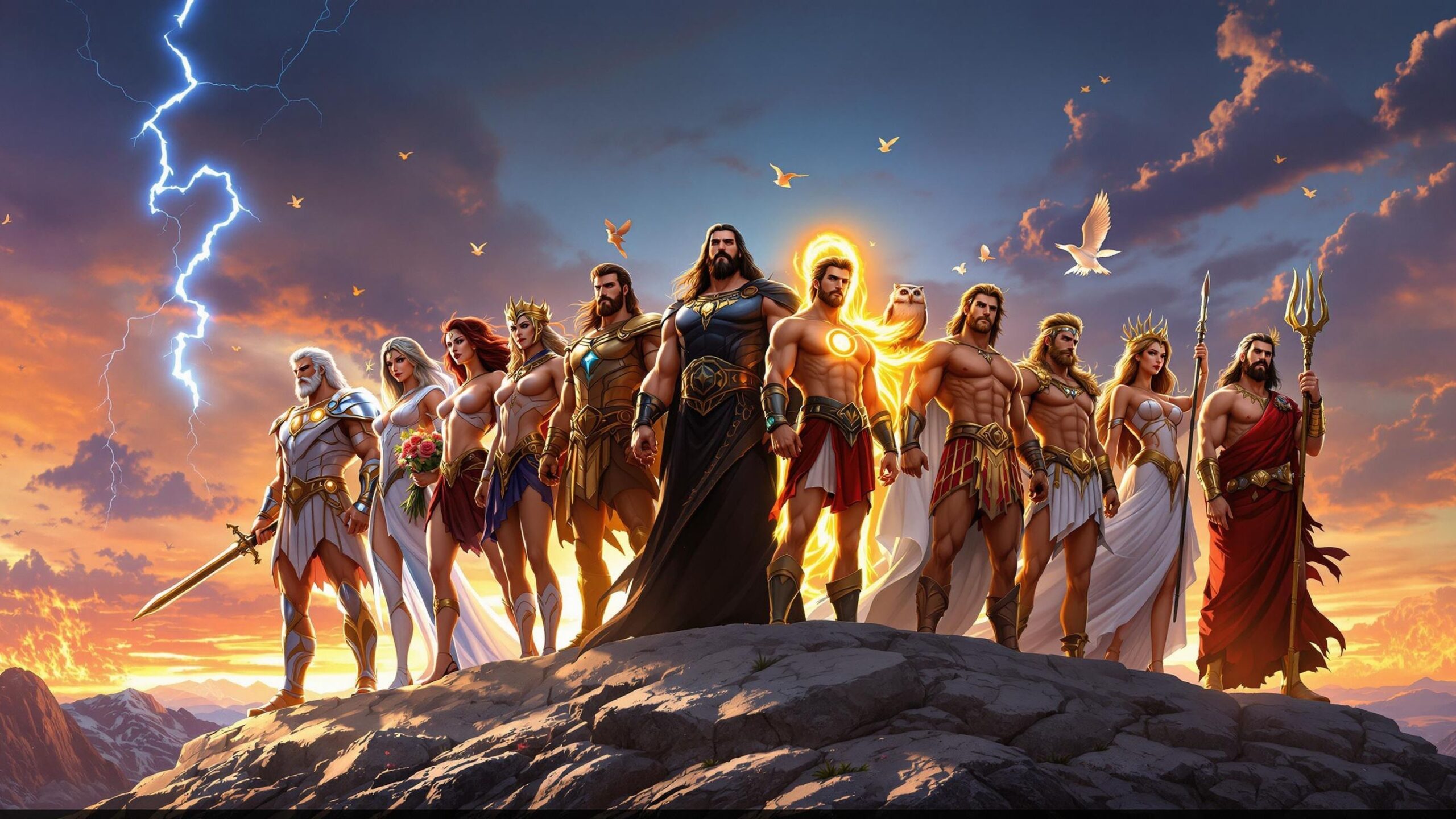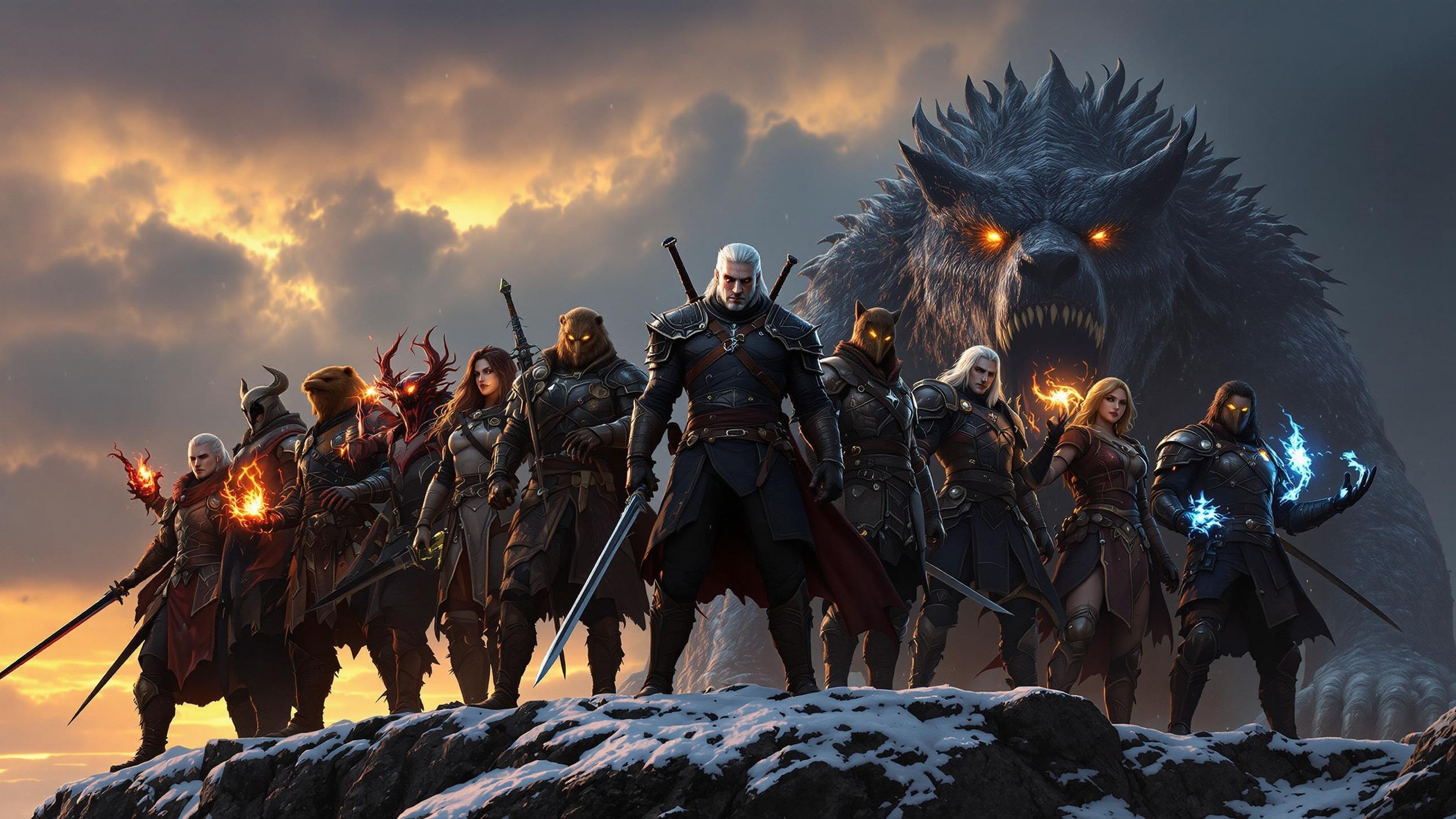Greek mythology is a sprawling tapestry of epic tales, gods of unimaginable power, tragic heroes, cunning tricksters, and monsters that haunt our collective imagination to this day. These stories have shaped Western literature, inspired countless adaptations, and continue to influence popular culture. At the heart of it all are the unforgettable characters who inhabit Mount Olympus, descend into the Underworld, and rage across the seas. From divine rulers to mortals who defied fate, here are the Top 10 Greek Mythology Characters of All Time—each etched into legend by their triumphs, flaws, and unforgettable stories.
#10: Hermes
Hermes is one of the most multifaceted figures in Greek mythology, known as the messenger of the gods, the god of commerce, and a protector of travelers and thieves alike. His speed was legendary—thanks to his winged sandals—and he was often portrayed as clever, quick-witted, and mischievous. Hermes played a vital role in numerous myths, including guiding Perseus to slay Medusa and escorting souls to the Underworld. Despite being a trickster, Hermes was also revered for his intelligence and versatility. He invented the lyre using a tortoise shell, which he later gave to Apollo as a peace offering after stealing his cattle—just one of many tales showcasing his playful cunning. His personality blended charm and cleverness, and he often acted as a bridge between gods and mortals. With his iconic caduceus staff and youthful appearance, Hermes stands as one of the most enduring figures in mythology, embodying the paradox of chaos and order.

#9: Persephone
Persephone’s tale is one of the most haunting and symbolic myths in the Greek canon. Abducted by Hades and made queen of the Underworld, her story explains the changing of the seasons and the duality of life and death. While initially portrayed as a victim, later interpretations see Persephone as a powerful ruler in her own right. Her annual return to the surface represents rebirth and growth, while her time in the Underworld symbolizes decay and rest. The myth is also a meditation on motherhood, as her mother Demeter’s grief plunges the world into winter. Persephone’s transformation from innocent maiden to sovereign of the dead reflects the human journey from youth to maturity. Often depicted with a pomegranate—the fruit that binds her to the Underworld—she is a symbol of both beauty and resilience. Few figures in mythology possess such depth and thematic richness, making Persephone a cornerstone of Greek myth.

#8: Theseus
As the legendary founder-hero of Athens, Theseus is perhaps best known for slaying the Minotaur in the labyrinth of Crete. But his adventures didn’t stop there. He also participated in the Calydonian Boar Hunt, journeyed to the Underworld, and united Attica under Athenian rule. His story blends heroism with political mythology, serving as a model for civic leadership. However, Theseus was not without flaws. He abandoned Ariadne after she helped him escape the labyrinth, and his later years were marked by misfortune and exile. These contradictions make him a deeply human figure. One lesser-known tale involves his friendship with Pirithous, whose hubris in attempting to kidnap Persephone led both of them into the Underworld—a mission Theseus barely survived. Often portrayed with a sword and wearing a short tunic, Theseus embodies the spirit of Greek heroism: brave, ambitious, flawed, and ultimately tragic.
#7: Hades
Often misunderstood, Hades is not so much evil as he is dutiful. As the god of the Underworld, he governs the realm of the dead with stern authority, ensuring balance in the cosmos. Unlike the more flamboyant gods of Olympus, Hades prefers solitude and order. His kidnapping of Persephone is central to his mythos, yet even this act has been reinterpreted as complex rather than purely malevolent. Hades is also credited with inventing the concept of wealth (his name is linked to hidden riches beneath the earth), showing how life and death were viewed as part of a larger cycle. He is rarely depicted as the villain in ancient texts; instead, he is a necessary figure in the divine ecosystem. Dressed in somber robes and often accompanied by the three-headed dog Cerberus, Hades commands respect rather than adoration. His role as both guardian and jailer of the dead gives him a mystique that continues to capture modern imaginations.
#6: Athena
Athena is the goddess of wisdom, war strategy, and crafts—one of the most revered and complex deities in Greek mythology. Born fully armed from Zeus’s forehead, she represents rational warfare and civic duty rather than chaos and bloodshed. Athena guided heroes like Odysseus and Perseus, always favoring intellect over brute strength. Her competition with Poseidon for the patronage of Athens, which she won by gifting the olive tree, shows her practical and peaceful nature. As a virgin goddess, she remained aloof from romantic entanglements, focusing instead on justice and governance. Her owl symbol and aegis shield are icons of vigilance and power. Athena’s wisdom was balanced by a fierce protectiveness toward her chosen cities and heroes, and her role in the Judgment of Paris—a contest that indirectly led to the Trojan War—reveals her pride and capacity for rivalry. A blend of logic, loyalty, and power, Athena remains a timeless emblem of female strength and intellect.
#5: Odysseus
Odysseus is the quintessential Greek hero—not because of superhuman strength, but due to his cunning and resilience. The king of Ithaca and central figure in Homer’s Odyssey, Odysseus is best known for his 10-year journey home from Troy, filled with monsters, temptresses, and gods. He outsmarts the Cyclops Polyphemus by calling himself “Nobody,” survives the song of the Sirens by being tied to his ship’s mast, and endures the wrath of Poseidon himself. His story isn’t just an adventure—it’s a meditation on identity, loyalty, and the human desire for home. Unlike other warriors, Odysseus relies on wit rather than brawn, making him relatable and deeply admired. However, he also shows hubris and cruelty, especially in his brutal revenge against Penelope’s suitors. These moral ambiguities make him one of the most realistic and layered characters in mythology. A master of disguise and storytelling, Odysseus continues to influence narratives of epic journeys and personal transformation.
#4: Hera
Hera, queen of the gods and wife of Zeus, is often portrayed as vengeful and jealous—but her story is far more nuanced. As the goddess of marriage and women, Hera represents commitment, dignity, and sometimes, the price of betrayal. Her anger is frequently rooted in Zeus’s many infidelities, yet she maintains her role as a powerful and respected deity. Hera was instrumental in numerous myths, both as an adversary and a protector. She tormented Heracles throughout his life, yet she also supported other heroes and gods when it suited her sense of justice. Her sacred animals, including the peacock and cow, symbolize beauty and nurturing. Hera’s personality is fierce and commanding—she demands loyalty and punishes betrayal with unwavering resolve. Her complicated relationship with Zeus underscores themes of power dynamics and emotional resilience. In many ways, Hera is the embodiment of regal authority, and her presence looms large across countless myths.
#3: Prometheus
Prometheus is the great benefactor of humanity, the Titan who stole fire from the gods and gave it to mortals. For this act of rebellion, he was eternally punished—chained to a rock where an eagle devoured his liver daily, only for it to regenerate each night. Prometheus symbolizes defiance, sacrifice, and the quest for knowledge. His tale predates many Olympian myths and casts him as a trickster and creator, even shaping mankind from clay. His name, meaning “forethought,” reflects his ability to see beyond the present, to envision a better future for humanity. He was also the first to challenge Zeus directly, exposing the tyrannical aspects of divine rule. Prometheus’s myth has been interpreted as an allegory for scientific advancement, rebellion against oppression, and the cost of progress. His legacy is enduring because he represents the spark of civilization and the courage to stand alone against tyranny, making him one of the most heroic and tragic figures in Greek mythology.
#2: Achilles
Achilles is the ultimate warrior of Greek mythology, a near-invincible hero whose rage and pride drove the plot of Homer’s Iliad. Born of a mortal father and the sea nymph Thetis, he was dipped in the River Styx, rendering him invulnerable—except for his heel. Achilles is known for his unmatched prowess in battle, slaying Hector and leading the Greeks to victory, but he is also defined by emotional intensity. His grief over the death of Patroclus leads to a tragic redemption arc, revealing the human beneath the hero. Achilles’ downfall—struck in the heel by Paris—is a metaphor for the fatal flaw in all greatness. He’s not just a fighter; he’s a symbol of youthful passion, honor, and the price of wrath. Quotes like “Sing, Muse, of the rage of Achilles” capture the primal force he represents. Though he dies young, Achilles achieves immortality through legend, forever standing as the paragon of tragic heroism.
#1: Zeus
Zeus is the king of the gods, the ruler of Mount Olympus, and the deity who embodies authority, justice, and elemental power. Wielder of the thunderbolt and overseer of both divine and mortal affairs, Zeus is the most recognized figure in Greek mythology. His story begins with rebellion—overthrowing his father Cronus and establishing the Olympian order. While often portrayed as a wise and omnipotent leader, Zeus is also infamous for his many affairs and volatile temper. His duality makes him both awe-inspiring and deeply flawed. He is a protector of oaths and guests, a punisher of hubris, and the architect of fate itself. His decisions shape nearly every myth in the Greek pantheon, and his symbols—the eagle, lightning, and oak tree—signify supreme dominion. Despite his imperfections, Zeus represents cosmic balance and the raw, untamable force of nature. His presence is felt in every thunderstorm, every moral judgment, and every twist of fate in myth.
Greek mythology remains a timeless wellspring of human emotion, divine drama, and moral complexity. These characters endure because they speak to universal truths—about love, power, betrayal, and redemption. Whether gods or mortals, tricksters or warriors, their stories continue to echo across time, inviting us to explore not just their myths, but ourselves.




